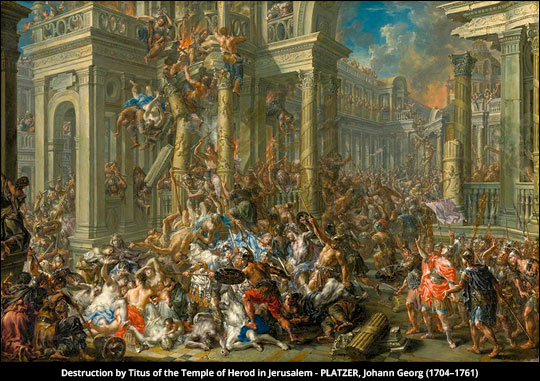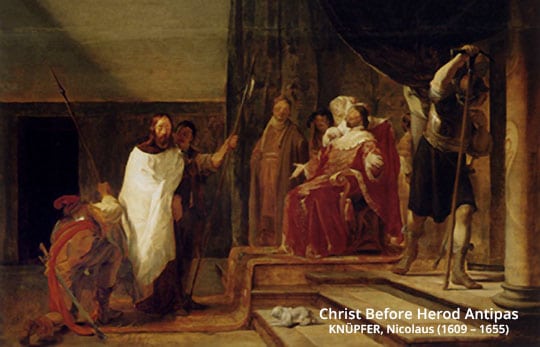
This study is about Herod Antipas’ threat to murder Christ and a series of very significant statements from Christ. It is difficult to determine which is the most significant. Herod’s threat to murder Christ occurred because Jesus was in the region of Perea which Herod controlled. But Christ is not intimidated. On the other hand, Christ lamented over Jerusalem and displayed His passion for Jerusalem while also revealing the timing of His death and where He would die. This event and Christ’s statements revealed that the end of Christ’s ministry was near. In the midst of the drama, Jesus made an incredible statement that gives us another glimpse into the true nature of Christ. It is a comment that is easily and often missed. Our study immediately follows the preceding discussion in Luke 13:22-30 titled “Are Only A Few Being Saved?” This study comes from Luke 13:31-35.
Herod Said To Leave Perea
Luke 13:31 introduces a new event in the life of Christ that occurred on the same day when Jesus explained that only a minority of people would be saved.
Just at that time some Pharisees approached, saying to Him, “Go away, leave here, for Herod wants to kill You.” Luke 13:31 (NASB)
We are told that some Pharisees approached Jesus and said that Herod wanted to kill or murder Him. The NASB says that this occurred “Just at that time.” A better translation of the phrase is “Just at the hour” since the Greek word that is translated as “time” is hora. Hora more accurately means “hour.” The meeting described in verses 31-35 occurred immediately after His teaching about how many people would go to heaven. Therefore as soon as Jesus finished teaching, these Pharisees came to Jesus and said that King Herod wanted to murder Him. We do not know if this occurred in the morning or afternoon; but whatever the time of day, it was dramatic.
There are three major views among theologians as to why the Pharisees told Jesus that Herod Antipas wanted to murder Him. One view is that some of the Pharisees were trying to protect Christ. This view says they encouraged Jesus to escape in order to save His life. This view can be supported by the fact that there were some Pharisees and leaders who did believe in Christ (John 3:1,10; 7:45-52; 12:42-43). Therefore, some were encouraging Christ to leave Perea in order to prevent His death. But this does not seem likely since John 12:42-43 states that those rulers who believed in Christ were fearful that the Pharisees would discover their faith in Jesus. Such an act could hardly go undiscovered.
The second view is that the Pharisees created the threat because they wanted Jesus to return to Jerusalem where they had greater authority and then they could have Him put to death. But if that had been true, then why did Jesus address His reply to Herod and not to the Pharisees (v. 32)? It will become clear that Christ knew the threat came from Herod.
The third view recognizes that the majority of the Pharisees wanted to murder Him and were relaying a message from Herod to Christ. The gospels repeatedly make it abundantly clear that the leadership of the Pharisees wanted Jesus to be murdered. Luke 11 records some of the more recent examples of the Pharisees’ hostility directed at Christ. Mark 3:6 and 12:13 tell us that the Pharisees were working with the Herodians in order to murder Jesus.
The Pharisees went out and immediately began conspiring with the Herodians against Him, as to how they might destroy Him. Mark 3:6 (NASB)
Then they sent some of the Pharisees and Herodians to Him in order to trap Him in a statement. Mark 12:13 (NASB)
The Herodians were supporters of King Herod Antipas (4 B.C. to A.D. 39), who ruled over Galilee and Perea. Perea is where Jesus was ministering at this time in His ministry. Herod was of Jewish-Idumean descent.[1] The Herodians were a political group who sought the favor of Herod Antipas in order to gain power. Therefore, we should not be surprised that King Herod sent a message through the Herodians to the Pharisees to Christ. The fact that Jesus knew the hearts of men (Luke 11:17) and directed His reply through the Pharisees to Herod also supports the conclusion that the Pharisees were working with the Herodians and Herod.
Since Luke 23:8 tells us that Herod wanted to see Jesus and have Him perform a sign, one might think that Herod did not want Him dead but alive in order to see some miracle or wonder. Matthew 14:3-5 and Mark 6:14-20 tell us that Herod hated John the Baptist and consequently killed him and then was afraid that John had been resurrected as Jesus Christ. Luke 9:9 adds that Herod wanted to meet Jesus, and Luke 23:8 reveals that Herod wanted Jesus to perform a sign for him. He wanted a “magic show.”
Now why did Herod want Jesus to leave Perea on this occasion? Did some people react negatively to Jesus’ ministry while He was in Perea and complain to Herod? Was Herod afraid of Jesus and also wanted to see some “magic” before putting Him to death? Or, is the correct conclusion that Herod wanted to drive Christ out of Perea? This seems to be the correct conclusion since Christ replied that He is leaving Perea, but not because of Herod’s threat.
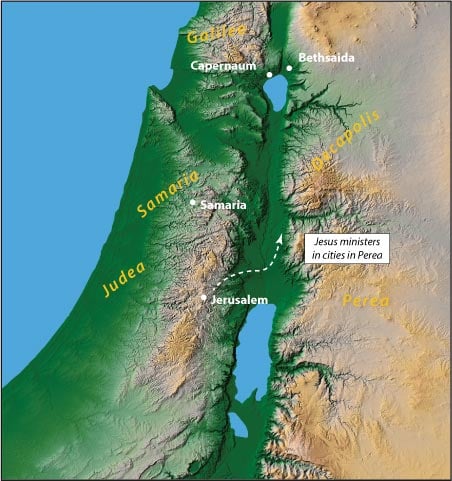
Herod Was A Fox
Jesus’ reply to the Pharisees teaches us that He understood they were working with Herod. His reply to their statement, ““Go away, leave here, for Herod wants to kill You” was a refusal to leave and He told them to tell that to Herod. This threat was not invented by the Pharisees. It was a real threat from Herod through the Herodians to the Pharisees.
And He said to them, “Go and tell that fox, ‘Behold, I cast out demons and perform cures today and tomorrow, and the third day I reach My goal.’ Luke 13:32 (NASB)
Jesus called Herod a fox! Now we can be sure that some will believe that Jesus’ example here justifies our calling people names too! In Matthew 23:13, 15-17, 19, 23, 24-27, and 29 He referred to the Pharisees as blind guides, hypocrites, blind men and blind Pharisees. But this does not mean that we can. When Jesus made such comments, He was God who accurately described them. When we make such statements, we are usually angry and do not have God’s insight into the heart and character of men and women. That is why in Matthew 5:22 Jesus warns us to not be angry with someone and call them “You-good-for-nothing” or “You fool.” We are not to call people names in anger. Matthew 7:1-5 warns us to not be judgmental of others.
Foxes are mentioned twelve times in Scripture. Usually there is no significance to the term fox, but in Psalm 63:10; Song of Solomon 2:15 and Lamentations 5:18 foxes are characterized as destructive animals. In Ezekiel 13:4 the false prophets are characterized as being foxes because they are foolish and follow the impulses of their own hearts. They are liars who claim to speak for the Lord. They were to be rejected. This agrees with a proverb about foxes in the Mishnah.
Greet everybody first, and be a tail to lions. But do not be a head to foxes.[2]
The message of the proverb is that it is better to be the tail of a lion, or last among royalty than to be the head first among scoundrels. In summary, the Jews regarded foxes as destructive and worthless. It also fits Herod Antipas’ behavior. He was a proud man and a foolish scoundrel. “He was the head of a fox.” Jesus described him accurately. Jesus knew the hearts of men and His statement was accurate and unbiased.
Jesus’ Reply To Herod
Then Jesus told the Pharisees to tell Herod, “Behold, I cast out demons and perform cures today and tomorrow, and the third day I reach My goal.” At first this seems to be a statement that says I am not intimidated by you. But Christ’s comment is more than that. His point is that He would be completing His planned ministry in three days and then return to Jerusalem. The Greek word that is translated as “goal” is teleioo. The word means “to make perfect, to complete or to accomplish.” Christ had planned His trip into the region called Perea. In three days His ministry goal would be accomplished and then He planned to leave Perea. He is not referring to how many people would be healed. He referred to the number of days in His plan. It is a good reminder that the results of one’s ministry must be left to God. We must plan and execute and it is God who gives the increase (1 Corinthians 3:6-9). Jesus had planned to return to Jerusalem. Herod must not think that he had intimidated Jesus into leaving nor that Jesus would be leaving because He was afraid. Christ was in control of what would happen to Him (John 10:18).
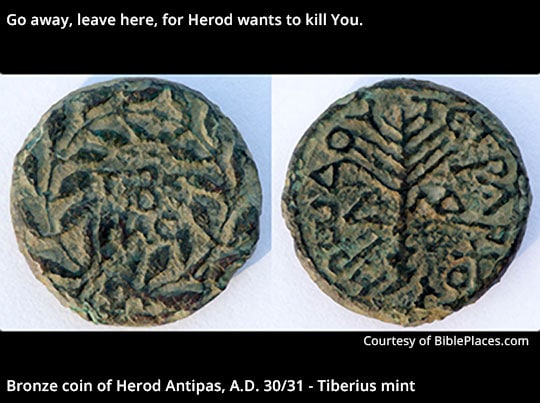
Jerusalem and The Prophets
The next verse simply tells us that Christ would continue ministering in Perea for the next two days and then leave for Jerusalem. But notice His comment about prophets perishing in Jerusalem.
Nevertheless I must journey on today and tomorrow and the next day; for it cannot be that a prophet would perish outside of Jerusalem. Luke 13:33 (NASB)
The Greek word that is translated as “it cannot be that” is endechomai. It means “to be possible, to be thinkable.”[3,4] Jesus is not saying that all of the prophets died in the city of Jerusalem, but that “it cannot be thinkable” that any prophet would die some other place than in Jerusalem.[5] Our English translations can mislead us into thinking that all of the prophets died in Jerusalem. The English Standard Version (ESV) captures the correct essence of verse 33,
Nevertheless, I must go on my way today and tomorrow and the day following, for it cannot be that a prophet should perish away from Jerusalem. Luke 13:33 (ESV)
The Holman Christian Standard Bible also captures the same sense.
Yet I must travel today, tomorrow, and the next day, because it is not possible for a prophet to perish outside of Jerusalem! Luke 13:33 (HCSB)
The fact that many of the prophets were not martyred in Jerusalem also supports this translation. While it is true that Moses did not die in Jerusalem but on Mount Nebo (Deuteronomy 32:49-52), it is important to note that he was not martyred. He died a natural death. The following prophets also were not martyred either: Joshua died in Timnathserah in Ephraim (Joshua 24:29-30). Samuel died near Jerusalem in Ramah (1 Samuel 25:1). Tradition states that Jeremiah died in Egpyt,[6] Ezekiel died in Babylon,[7] and Daniel died in Babylon.[8] Traditions about the deaths of other prophets are given in the Lives of the Prophets, a pseudepigraphal book.
But John the Baptist was a martyred prophet. He was martyred in Galilee and not in Jerusalem. One of the most notable prophets who died in Jerusalem was Isaiah. Hebrews 11:32-38 lists many prophets who had been murdered but not all of them were murdered in Jerusalem. When Hebrews 11:37 states that some prophets “were sawn in two” it is believed that this refers to the prophet Isaiah due to a tradition related in The Martyrdom Of Isaiah (2nd Century A.D.).[9,10] It is believed that he died near the Pool of Siloam in Jerusalem.
A review of the historical accounts of martyred prophets reveals that every prophet did not die in Jerusalem. Yet, earlier in Luke 11:47-51 Jesus referred to “the blood of Abel to the blood of Zechariah, who were killed between the altar and the house of God.” When He said these words, He included Abel as a prophet even though Scripture never calls Abel a prophet. Therefore, it seems that Jesus is referring to prophets who were martyred in Jerusalem whom we may not know. Therefore, the correct translation supports the facts of history. Some prophets were martyred in Jerusalem, but not all. Christ’s point was the prophets who were murdered by the religious leaders should have died in Jerusalem, the location of the temple, the center of worship.
Christ alluded to the location of His own death. He also referred to Himself as a prophet. Moses had prophesied of His coming in Deuteronomy 18:15-18. John the Baptist had been asked if he, John, was the prophet mentioned in Deuteronomy 18:15-18 and he replied, “No” (John 1:21). When the people in Christ’s hometown of Nazareth rejected Him, He referred to Himself as a prophet (Matthew 13:57). Matthew 21:11 reports that at the time of the Triumphal Entry the people called Christ a prophet. Jesus was our Savior, Prophet, High Priest, King and God. Jesus was simply saying that His death, the death of a prophet, should occur in Jerusalem and not some other place. In fact, the greatest of all the prophets should be martyred in Jerusalem. No other city was more fitting.
O Jerusalem, Jerusalem
Then Jesus lamented that the city of Jerusalem would kill prophets.
O Jerusalem, Jerusalem, the city that kills the prophets and stones those sent to her! How often I wanted to gather your children together, just as a hen gathers her brood under her wings, and you would not have it! Behold, your house is left to you desolate; and I say to you, you will not see Me until the time comes when you say, ‘BLESSED IS HE WHO COMES IN THE NAME OF THE LORD!’” Luke 13:34-35 (NASB)
The repetition of the name Jerusalem adds emphasis. It was typical to repeat a word to add emphasis. Jesus said that Jerusalem had a habitual pattern of killing and stoning the prophets. The Greek tense for “kill” and “stones” are both present participles. That is, Jerusalem had killed and would continue to kill prophets. Jesus was soon to be the next prophet that Jerusalem would kill, but He would not die by stoning. He would die by crucifixion. Isaiah was sawed in half. Jerusalem did not care for its prophets. In Matthew 5:11-12 and Matthew 23:31, Jesus had said the prophets were killed by the religious leaders and His death would not be any different.
When Jesus said, “How often I wanted to gather your children together,” He referred to God’s repeated call to His people to return. We must remember that many of the Old Testament prophets called the people in Judah to repent and turn to God. But they refused. As a result, the Babylonian Army invaded Judah, conquered Jerusalem and deported its civilians. After the seventy years of captivity in Babylon, the Jews returned to Jerusalem. One would think they would have learned their lesson, but the book of Malachi reveals that they responded with indifference to God. It becomes apparent the priests did not love God, did not teach the law, husbands divorced their wives, and they did not give tithes to God. They were godless and self-centered. They were not interested in a relationship with God. This helps to explain Christ’s comment, “How often I wanted to gather your children together, just as a hen gathers her brood under her wings, and you would not have it!” God had called them to Himself through the Old Testament prophets, but they repeatedly refused the appeals of the prophets.
Notice that once again Christ reveals that He claimed to be God. He said, “I wanted to gather your children together.” Notice the word “I.” This is another claim to be the God of the Old Testament.
Jews Will Be Removed From Jerusalem
As a result Jesus said, “Your house is left to you desolate.” The Greek word for “left” is aphiemi. It is in a present passive which means this will happen to them. God would cause this to happen. Jesus referred to the future invasion of the Roman Army in A.D. 70. Later in Luke 21:20-24 Jesus provided more information about the destruction of Jerusalem and that the Jews would be removed from the city. The Roman Army annihilated every Jew and leveled the city walls. There was not one stone left upon another when the Roman army was finished with Jerusalem. In the years that followed, Jews were prevented from returning to the city. The city was truly emptied of Jews.
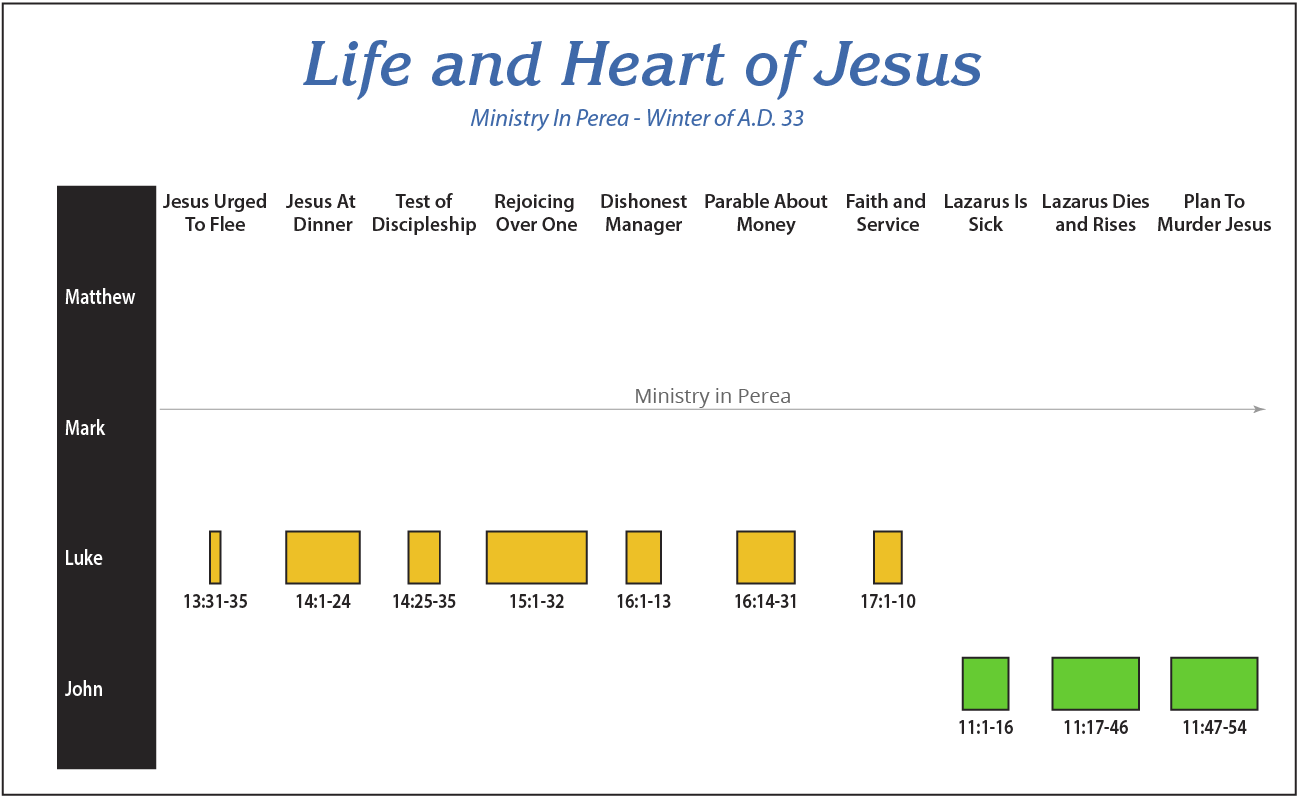
Prophesy Of The Triumphal Entry
Jesus’ final comment to this group of Pharisees is prophetic.
You will not see Me until the time comes when you say, “BLESSED IS HE WHO COMES IN THE NAME OF THE LORD!” Luke 13:35
Jesus tells these religious leaders they will not see Him again until they hear the statement, “Blessed is He who comes in the name of the Lord!” When did they hear this statement again?
It occurred five months later during Christ’s Triumphal Entry into Jerusalem. The gospels of Matthew, Mark, and John state that the crowd shouted “Blessed is He who comes in the name of the Lord!” (Matthew 21:9; Mark 11:9; John 12:13). The gospel of Luke changes the statement slightly, “Blessed is the King who comes in the name of the Lord!” When a crowd is shouting in excitement, it is common for variations of a statement to occur. It may be that Luke heard an alternate variation and that is the one he recorded. It is clear the statement is accurate. Christ was the King and He did come in the name of the Lord. He came to do the will of the Father (Malachi 3:1; Matthew 10:40; Mark 9:37; Luke 4:18; 10:16; John 4:34; 5:30; 6:38-39, 57; 8:18; Hebrews 10:8-9).
Conclusion
Christ came to do the Father’s will. He came in the name of the Lord of Hosts. Herod’s threat reveals that God the Father was drawing the focus of the political and religious leaders to Jerusalem. Christ was finishing His ministry in Perea and then He would move to Jerusalem. That is where He would die. Jerusalem would soon be the focus of heaven, hell. Jerusalem would murder the Prophet prophesied in Deuteronomy 18:15. The city that God loved would murder the Savior of the world.
In Joel 3:17 God declares that in the millennial kingdom Jerusalem will be different. It will be His city. He will reign as king over the city. It will be the capitol of the world. It will be holy!
Then you will know that I am the LORD your God,
Dwelling in Zion, My holy mountain.
So Jerusalem will be holy,
And strangers will pass through it no more.
Joel 3:17 (NASB)Then it will come about that any who are left of all the nations that went against Jerusalem will go up from year to year to worship the King, the LORD of hosts, and to celebrate the Feast of Booths. And it will be that whichever of the families of the earth does not go up to Jerusalem to worship the King, the LORD of hosts, there will be no rain on them.
Zechariah 14:16-17 (NASB)
References:
1. Josephus. The Antiquities of the Jews. book 14, chap 15, section 2.
2. Joel Neusner. The Mishnah. Yale University Press. 1988. Abot. 4.15., p. 683.
3. Johannes P. Louw and Eugene Albert Nida, Greek-English Lexicon of the New Testament: Based on Semantic Domains. United Bible Societies. 1989, vol. 2 p. 668.
4. Moulton and Milligan. Vocabulary of the Greek Testament. Hendrickson Publishers. 1997. p. 212.
5. F. Godet. The Gospel of Luke. Funk & Wagnalls Co., 1887. p. 362.
6. Lives of the Prophets, 2.1. James H. Charlesworth, ed., “Testament of Benjamin.,” The Old Testament Pseudepigrapha, trans. H. Andersen (Hendrickson, 2013), vol. 2., 386.
7. Ibid. Lives of the Prophets, 3.1, p. 388.
8. Ibid. Lives of the Prophets, 4.1, p. 390.
9. The Martyrdom Of Isaiah, 5.1-2. James H. Charlesworth, ed., “Testament of Benjamin.,” The Old Testament Pseudepigrapha, trans. H. Andersen (Hendrickson, 2013), vol. 2., 163.
10. Ibid. Lives of the Prophets, 1.1-3, p. 385.
